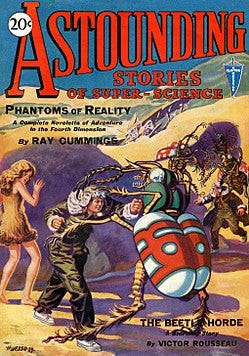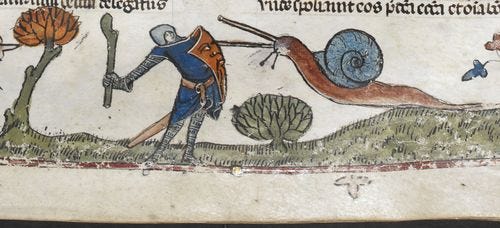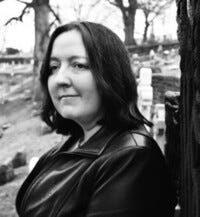This year, I'm going to Worldcon. And that means I get to vote in the Hugo Awards. That wasn't quite the reason I signed up to go, but they let anyone who buys a membership vote, so it's a great bonus.
The Hugo Awards for Best Novel (which I wrote about last month) are the best-known Hugos, but there're many other categories too: Best Novella, Best Novelette, Best Short Story, Best Graphic Story, Best Dramatic Presentation (long and short form), and (new in the last decade) Best Series - as well as several non-story categories.
It makes sense that Best Novel is the best-known. If you disregard Dramatic Presentations (where several popular movies got nominated this year), novels are by far the best-known form of science fiction and fantasy.
This wasn't always the case. In the Golden Age of Science Fiction when the Hugos started, short stories were much more common; writers (such as Asimov, Heinlein, Niven, and many more) usually got their start there before eventually serializing a novel in the same science-fiction/fantasy magazines that published short stories. Accordingly, the Hugos have three different categories for works shorter than novel length, against one for novels.
In that era, subscribing to those magazines got you most of what was published in a year. Most "trufen" of that era (as Worldcon attendees traditionally term themselves) probably already knew all of the nominated works, and many of the same works that didn't get nominations. This made the Hugos less susceptible to fads and chance of what trufen happened to read, and also easier for voters to vote fairly in.

But that era's gone. Nowadays, the magazines are in serious financial trouble or dead, while science fiction and fantasy novels - from those writers lucky enough to be picked up by traditional publishers - are booming. I've been hearing that the short story might be making a renaissance thanks to ebooks, but it hasn't yet. Or, at least, I haven't heard of it and the trufen apparently haven't either. Every short story and novelette nominee but one was published in one of the legacy magazines or their more modern imitators.
The Hugos have acknowledged this change in one way: the Best Series award, added in 2017 to note how nowadays many times, the story an author sets out to tell is even longer than a single novel. I agree, and I think this's a good award. It doesn't redress the imbalance, but it goes some ways.
That said, I can't very well read six series in time to vote on them. I haven't read any of them yet - I've only heard of one of them (The Stormlight Archive by Brandon Sanderson), and I've been holding off starting that until he finishes it. So, I'm abstaining there.
(I'm also abstaining in most of the non-story categories. I don't know the "Best Editor"; I've only followed one of the "Best Semiprozine" and none of the "Best Fanzine" or "Best Fancast" nominees. Maybe I'll learn enough about "Best Professional Artist" to vote by the deadline, but at least now I don't know any of them either.)
The multiple short fiction awards are still around, and those I can read. Here're my ballots for them:
Best Short Story (defined as <7,500 words):
1. “Marginalia” by Mary Robinette Kowal - Charming premise of medievals fighting giant monstrous snails! The characters are well done too.
2. “Three Faces of a Beheading” by Arkady Martine - A rebellion against the empire nests into a video game.
3. “Why Don’t We Just Kill the Kid in the Omelas Hole” by Isabel J. Kim - The reason, apparently, is that people do, but Omelas finds another kid and there's no real institutional change. The metaphor is belabored, but more appropriately than in many takes I've read on Omelas.
4. “We Will Teach You How to Read | We Will Teach You How to Read” by Caroline M. Yoachim - This's almost poetry, about an alien message. It's more vignette than story; not much there but what is there is charming.
[NO AWARD]. Just like with “Best Novel,” traditionally, this's saying works below this aren't worthy of a Hugo; that I'd rather no award be given than they be awarded. I’m ranking it here because the four above here are the works where I enjoyed parts, and where I could see their merit. Below, I didn't enjoy at all.
5. “Five Views of the Planet Tartarus” by Rachael K. Jones - A competent series of horror vignettes. It does well what it's trying to do, but what it's trying is not to my taste.
6. “Stitched to Skin Like Family Is” by Nghi Vo - Slow build to villain protagonist; I don't see anything particular to like about this.

Best Novelette (defined as 7,500-17,500 words):
1 "The Brotherhood of Montague St. Video," by Thomas Ha - In a world where all texts are ebooks which get routinely altered and updated, what happens when our protagonist gets a rare original copy of a print book? I would've read it for the premise alone.
2 "Lake of Souls," by Ann Leckie - A poignant tale exploring themes of personal identity on an alien planet with aliens having a secret. This narrowly lost first place; if the ending resolved more of the themes, it would've taken it.
3 "The Four Sisters Overlooking the Sea", by Naomi Kritzer - A modern part-allegorical takeoff on the selkie myth, where the woman protagonist who had to give up her career in marine biology gets her revenge with the help of the sea. The characters are sadly one-dimensional, but it's very well-told and the slow pace offers an engaging buildup.
4 "By Salt, By Sea, By Light of Stars," by Premee Mohamed - This fantasy about a wizard with a secret shame who has an apprentice forced on her starts out extremely promising, but the climax ends up weak on all points. The secret comes out unchanged, she still feels just as ashamed, and the external conflict is told very poorly. If it stayed as good as in the first half, I'd vote for it in first place; as it is, it's way down here.
[NO AWARD]
5. "Loneliness Universe" by Eugenia Triantafyllou - A painful allegory where our protagonist's friends start disappearing so she can't see them in person. However, nothing's done with this allegory; it's just presented and we see her feelings as it goes on.
6. "Signs of Life" by Sarah Pinsker - A woman reconciles with her estranged sister, but without anything really happening in the story. I read it through waiting for some other shoe to drop, but in vain.
Best Novella (defined as 17,500-40,000 words; above that it's counted as a novel):
1. The Butcher of the Forest, by Premee Mohamed. After the Tyrant's two kids wander off into the dark enchanted forest, our protagonist is ordered to bring them back or else. We see dark mirrors of many fairy-tale images, as our protagonist fights between her hatred for the Tyrant and her sympathy for innocent children. It's excellently paced, with an ending that leaves me wondering just the right amount. I enjoyed this from beginning to end.
2. What Feasts at Night, by T. Kingfisher. A retired soldier confronts a monster from folklore, who kills people in the night by denying them sleep - and also confronts PTSD from the war, and people's social expectations. This bland retelling isn't wrong, but what makes this story is Kingfisher's excellent prose and the narrator's self-effacing narration. Despite the horror elements of the summary, this was a pleasure to read.
3. The Tusks of Extinction, by Ray Nayler. After mammoths are resurrected by genetic manipulation, the last elephant biologist (elephants having gone extinct in the wild) is put in a mammoth body to teach them how to be mammoths. But she also teaches them how to hunt human hunters back. It's a great premise. Unfortunately, it's flawed by very depressing pictures of hunters that I wished I hadn't read, and a setup that feels too contrived on several points about the design of the mammoth reserve.
4. The Brides of High Hill, by Nghi Vo. In a fantasy-counterpart ancient China, a young priest accompanies a wedding party to the home of the bridegroom-to-be who is hiding some dark secrets... and, it turns out, even more dark secrets and lies than we think when the priest starts poking around. I liked the one-sentence version of this premise, but the revelations we got weren't as interesting as I'd hoped. Plus, until we got there, I felt this story dragged somewhat, and the characters weren't quite interesting enough to fill the gap.
[NO AWARD]
5. Navigational Entanglements, by Aliette de Bodard. In a world where interstellar wormholes are haunted by shadowy monsters that eat humans, we follow two of the shipping guild's monster-hunters as they face the monsters, the machinations of powerful guilds, and a budding romance. I've seen all of these tropes before, which isn't bad in itself - but the prose wasn't that well-done and none of the characters grabbed me in this telling.
6. The Practice, the Horizon, and the Chain, by Sofia Samatar. In this generation-ship story, the ship is under contract to a mining company and contains an underside full of slaves whom most people in the upper side can ignore. But, the author spends too much time on his characters' social learning and balancing a few bits of good against losing social status, and too little time on any actual plot.

It’s been a while since I’ve read so many novellas and novelettes in such quick succession. I’m seized by a renewed appreciation for the format. Stretching out any of these plots to novel length would’ve made the stories worse - you would’ve needed to stretch them thin or else insert new complications which would’ve been superfluous to the core conflict. A good novella or novelette does things that can’t be done well in novels.
So, I’m sorry that the old science-fiction and fantasy publication culture has passed away. The new focus on novels isn’t bad in itself, but it’s shortchanged other shorter sorts of fiction. These three Hugo categories can remind us of what has been - if not lost - often pushed to the back of our minds.
And, when told well, it’s fun to read. I’m looking forward to Worldcon.



